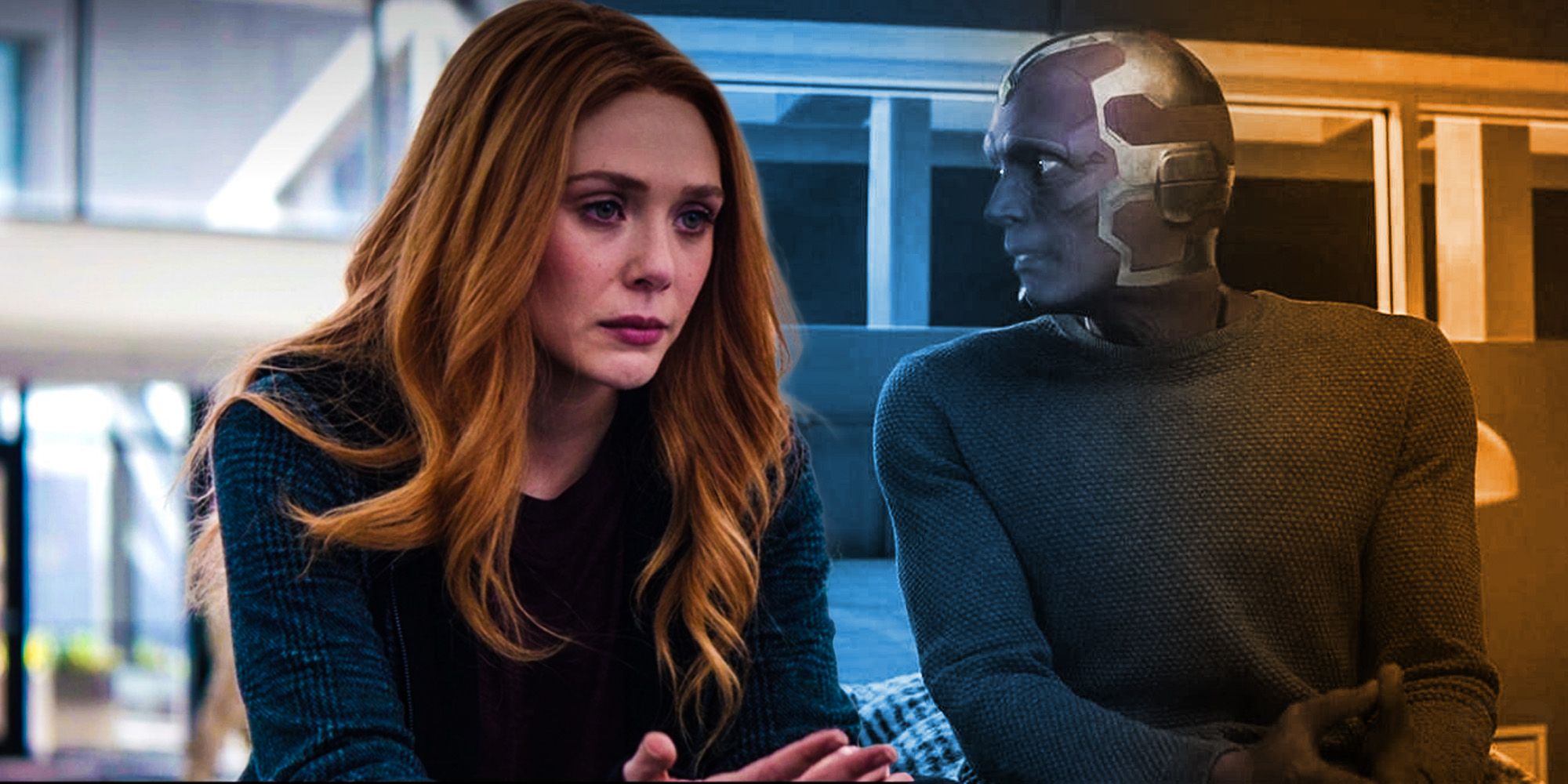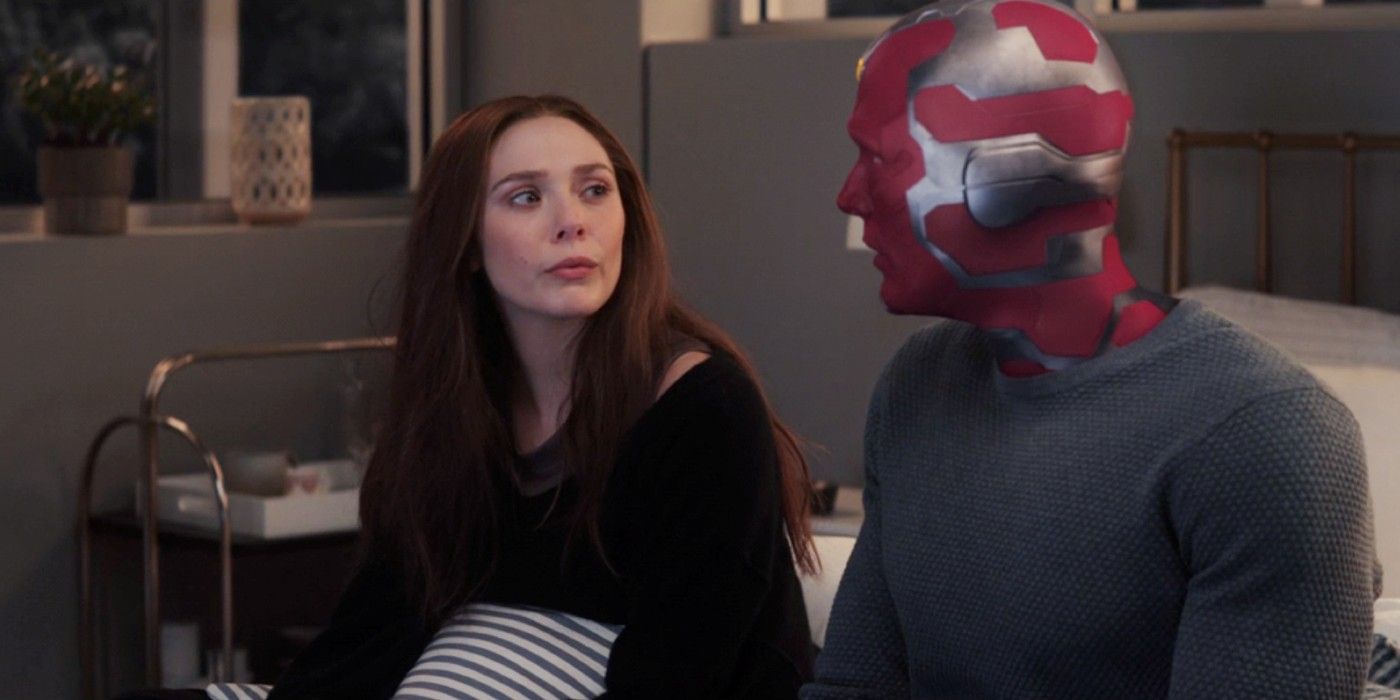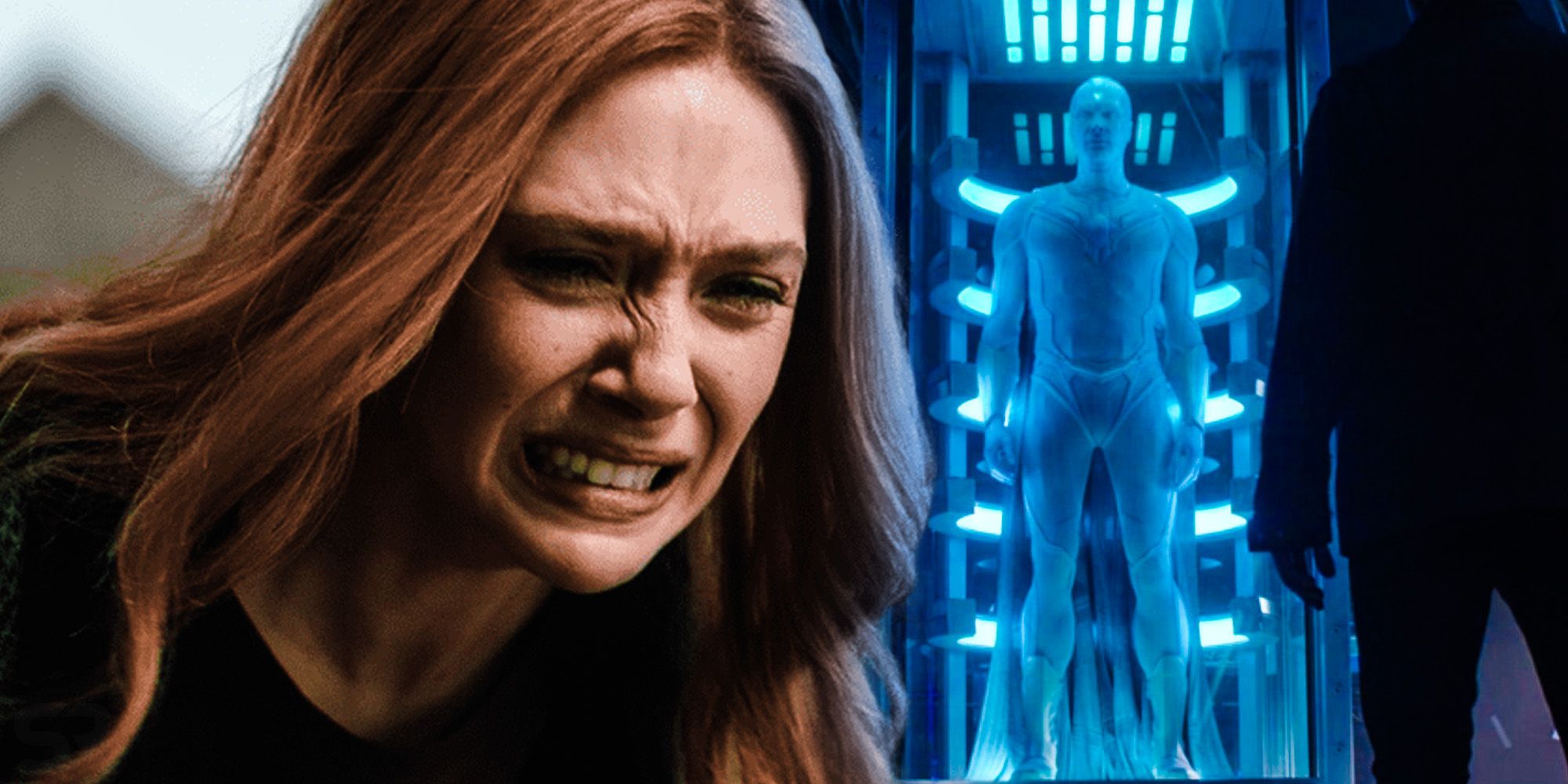
Vision's line in WandaVision episode 8 about grief not only resonated with audiences but also fixed a longstanding problem the MCU has had with death. For the majority of the series' run up through its penultimate episode, the draw has been the brilliantly blended structure of strict genre sitcom meeting the familiar beats of the MCU, with enough Easter eggs and references to keep those familiar with the comic books spinning theories and speculating on what might happen next. As with any IP that has deep lore, some of those fan theories admittedly read far too much foreshadowing into elements that were relatively straightforward. Still, part of the great fun of WandaVision has been the post-episode discussion each week.
Yet, underneath the comic book connections and the sitcom-wrapped mystery, at its heart, WandaVision is a show about a woman working through the process of grieving. Like most superheroes, the characters of the MCU have lost much. No one, however, has had as much sustained loss as Wanda Maximoff. When she was 10, she and her twin brother, Pietro, were orphaned in a bomb blast that killed their parents, forcing them to grow up in an orphanage in a war-torn country. Wanda was, at most, only in her early 20s when she lost Pietro in the Avengers' battle with Ultron. A few years later, she was responsible for the death of multiple civilians when her magic went awry. Finally, she was forced to watch the love of her life, Vision, die twice, once by her own hand and once by Thanos before being snapped out of existence herself. When she returned, she was forced to confront the horrific sight of her soulmate's synthezoid body ripped apart and desecrated on a cold laboratory table.
Wanda being forced by Agatha Harkness to relive these traumatic moments was one of the most painful chapters ever told in MCU history, but they ultimately led to a poignant flashback scene between Wanda and Vision that unfolded in the weeks after Pietro's death. As Vision sat on her bed, Wanda haltingly poured her heart out to him about the grief and depression hitting her in waves. Characteristically, Vision put his own simple and eloquent spin on the negativity of grief: "But what is grief if not love persevering?" It was a line that resonated with people across the spectrum, audiences connecting with it on a fundamental level. Marvel finally grappling with its indifferent approach to loss and death could not have come at a better time.

Vision has long been Marvel's philosopher king, a being whose slight remove from humanity enables him to understand it best. More than any other MCU character, Vision is the one who spends the most time grappling with abstract concepts. While the other Avengers are doers, Vision is a thinker, Rodin's famous sculpture made synthetic flesh. Unsurprising, then, that he's had some of the most starkly beautiful lines in the MCU - "But a thing isn't beautiful because it lasts" from Avengers: Age of Ultron being the first and most memorable of these. He is a creature born into and made of existential crisis and it's why he was so well-suited to deliver an interpretive view of grief that was desperately needed by a world struggling to adapt to a state of prolonged existential angst.
Wanda's MCU journey has been the world's journey of the past year: She has not been able to properly grieve for her compounding losses, instead forced to carry on in her duty to others, forced to carry on in her role as an Avenger, not given the chance to slow down and fully process all that she has needed to without realizing it. There is no cap on the emotional impact of loss, no number past which it stops hurting, but it is possible, when the losses pile up too many in too short a time, to become numb to it.
It's what the world has collectively experienced, perhaps no country more than the U.S. To date, 525,776 Americans have died of Covid, 2,543,285 in the world. Two million, five hundred and forty-three thousand, two hundred and eighty-five people gone in the span of a year from a merciless disease, often dying alone and scared. Schools shuttered, businesses closed, many for good, a unique blend of unrelenting stress and stagnating isolation ripping apart the social fabric and keeping people from the one thing humans need most right now: a collective period of mourning, to grieve together over all that has been lost of life, livelihood, loved ones and security. It's a fundamental aspect of humanity the MCU has long ignored.

The world has been collectively denied a natural, healthy process of grieving, an emotional stunting mirrored in the MCU since its inception. Every single hero has experienced enormous, personal Earth-shattering loss. The death of parents. The death of loved ones. The death of friends. The loss of one's future, or of one's own mind. The loss of childhood innocence, the death of all those they couldn't save. It is a staggering amount of heartbreak for a relatively small number of people.
Yet, until Wanda's emotional journey in WandaVision, it's rarely been touched upon in the MCU. Heart-shattering death and loss happen to the Avengers and their allies, and then the story moves on. The only two Avengers to ever allow themselves to grieve - really grieve, to sit with it and not try to run from it or deny it - have been Natasha and Steve in Avengers: Endgame. Beyond those fleeting scenes, any significant consequences, such as the Sokovia Accords, have only related to the external devastation by characters; the internal devastation of characters has remained largely unexplored.
It's a recurring pattern in the MCU. Thor didn't really grieve the loss of his family so much as completely disassociate. Loki was ever so briefly the picture of grief after Frigga's death in Thor: The Dark World, but Thor immediately cut his grieving short by offering him vengeance instead. Star-Lord is still reviled by fans for punching Thanos in his grief over Gamora instead of sticking to the plan. Steve Rogers jumped from losing 75 years he'll never get back and the chance to be with his one true love right into being an Avenger, burying himself in work. Bucky Barnes has never fully expressed the horror his own mind being taken from him. Rocket Raccoon and Nebula were torn apart and put back together over and over and channeled it into rage. Drax lost his entire family and it turned him into a single-minded hero bent on revenge; Helmut Zemo lost his family and it turned him into a single-minded villain bent on revenge. Peter Parker is only 16 years old and has experienced more death and trauma than most adults; it's never been addressed. The M.O. of Marvel's heroes and villains alike has been to channel devastating loss into rage or duty, never a natural cycle of grief. Again: Doers, not thinkers. Because of this, Marvel has conditioned audiences to expect heroes to be stalwart and unbowed even while bearing the heaviest weights, but it's not a natural response or a responsible message to send.

WandaVision finally addresses it all directly; Vision's line is both the permission to grieve and a reshaping of the concept of grief in the MCU by fully acknowledging it exists in the first place. To Vision, the compassionate and wise synthezoid, grieving is not a display of weakness, but of love. It is a natural extension of humanity. Rather than offering Wanda hollow platitudes, he instead understands, even better than the humans around her, that profound grief goes hand-in-hand with profound love.
So Wanda leans into it. In her, the cycle of grief long denied the rest of the MCU is playing out fully. The alternate reality Hex bubble of Westview may be a tremendously powerful witch's way of working through emotional devastation, but she's still working through it, nonetheless. For the audience, it's about figuring out the mystery of her world; for Wanda, it's about saying goodbye to her whole world. The Westview Hex isn't an act of aggression but a protective cocoon that allows Wanda to go as deep into her grief as she needs to, a magically-induced emotional coma that enables her to process the enormity of her loss and pain to reemerge when she's ready. Anyone who has experienced profound loss understands this, the way the mind partially shuts down to protect the heart from being battered by the full onrushing wave of desolation hitting all at once.
It's an emotional arc the other Avengers have never been granted, a long-overdue acknowledgment of the fullness of the lived experience of these characters. Audiences only know of characters what they see on screen. Allowing the audience to finally see what's behind the emotional curtain, to be granted a glimpse at the incredibly human response of Scarlet Witch, a woman with the ability to remake the world, is to be reminded these characters are humans before they are heroes. Wanda's grieving process reframes the other Avengers by association; one suddenly understands what they may be wrestling with in the moments in-between the times they're on screen. WandaVision was the first Marvel property to fully explore the aftermath of death and loss, but hopefully, it won't be the last. The Avengers and the audience both deserve richer emotional landscapes than what they've been granted thus far.
from ScreenRant - Feed https://ift.tt/302m56z

0 Comments